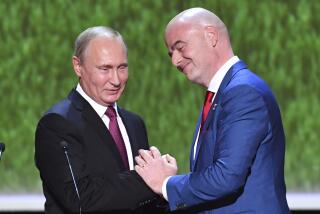Soviets Are Adjusting to a Pro Sports World
- Share via
MOSCOW — Professional, a once derogatory term used to describe money-hungry Western athletes, is no longer such a dirty word with the Soviet State Sports Committee.
Coaches, athletes and administrators are learning to say it with much greater ease in the era of Soviet leader Mikhail Gorbachev’s proclaimed policy of glasnost, openness and honesty in Soviet society.
At least one Soviet sport, soccer, is even trying it with the Communist Party’s official blessing.
But there is an obvious lack of experience in administering a pro sports league or franchise. One spinoff is a bidding war for star players with salaries approaching a 600 rubles ($960) a month. Not much by Western standards but three times the average wage here.
There is also a growing realization Soviet sports teams playing in international events have been hurt by retaining an “amateur” tag. Some adminstrators, poorly versed in sports finance, simply get ripped off in the West.
It was not so long ago the Soviet Union vehemently condemned sports professionalism as a decadent Western phenomenon while touting its “purely amateur” programs.
The so-called agricultural students, policemen, soldiers and teachers who paraded to the medal stands in international competitions were, according to Soviet officials, nothing more than that.
But with even the Olympic movement now allowing some professionals to compete, the Soviet Union finally appears ready to recognize its own athletes as professionals.
Leading the way are former athletes. Valery Brumel, the Soviet high jumper and gold-medal winner in the 1964 Tokyo Olympics, has become an unofficial spokesman for the professionalism movement.
“We did not spare ourselves or our health,” he said in a recent interview with the weekly Moscow News. “We were told ‘for our people’s sake, for the fatherland’s prestige’ and we went out of our way to win. Sport, sport, sport--that’s all many of the colleagues had known professionally. We were not amateurs.
“However it was not the thing to speak of, that we had professionals in sports, even though the athletes do get remunerated. I think it is high time to recognize big-time sports as a professional affair and to think about pensions for athletes.”
Soviet athletes have been drafted by the NBA and NHL but have yet to get permission to pursue the offers.
Only players past their prime and over 30 are permitted to leave and sign long-term resident contracts in the West. There are at least eight Soviet hockey players in various clubs in Europe and Japan. The youngest is 33, old for a hockey player.
The Soviets still remain new to the concept of earning money from their international teams.
To the horror of some ideological purists, the Soviet national hockey squad wore the logo of a Swedish computer company on its jerseys during an exhibition against Sweden in April. It earned the club an estimated $15,000.
More to Read
Sign up for Essential California
The most important California stories and recommendations in your inbox every morning.
You may occasionally receive promotional content from the Los Angeles Times.













